Holding signs reading “F*** You Mugabe” and “Mugabe Must go,” an estimated thousands took the streets of Zimbabwe’s capital, Harare, demanding the removal of longtime dictator Robert Mugabe.
The Zimbabwean military intervened in the government this week, insisting that their action to remove Mugabe was not a coup d’etat and meant to safeguard the head of state’s legacy, not replace him.
The U.S. State Department has explicitly rejected the term “coup d’etat” for the series of events occurring in the African nation this week, while calling for “a quick return to civilian rule.”
In a rare move, the military allowed a public protest of Mugabe on Saturday, which the BBC described as having a “party atmosphere.” Among those supporting the protest, the BBC reports, is the war veterans’ association – a group who fought for independence against Britain and previously supported Mugabe – and Mugabe’s party, Zanu-PF.
“We want to restore our pride and tomorrow is the day … we can finish the job which the army started,” war veterans’ association chairman Chris Mutsvangwa said, according to News24.
Zanu-PF leaders will reportedly meet on Sunday to officially depose Mugabe and hand power to Emmerson Mnangagwa, the former vice president. Mnangagwa fled the country after Mugabe removed him and set the stage for his wife, Grace Mugabe, to succeed him. Grace Mugabe has little to no support among both members of the public and the military, and has attracted widespread hatred for her ostentatious displays of wealth and outrageous flaunting of her stranglehold on power, once stating that, after Mugabe dies, she would “field him as a corpse” in presidential elections.
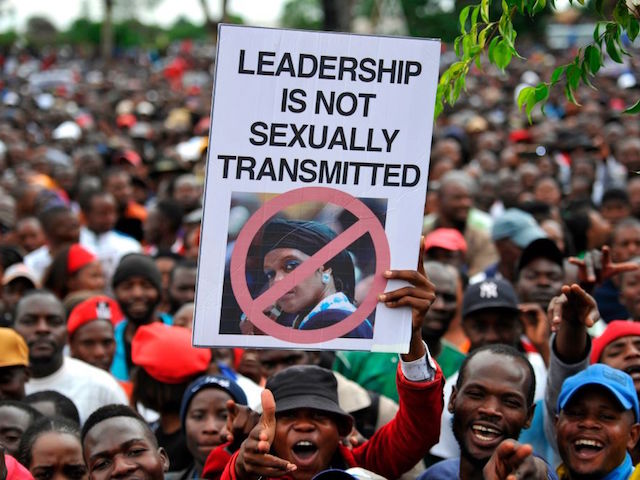
People hold an anti-Grace Mugabe placard during a demonstration demanding the resignation of Zimbabwe’s president on November 18, 2017 in Harare. ZINYANGE AUNTONY/AFP/Getty Images
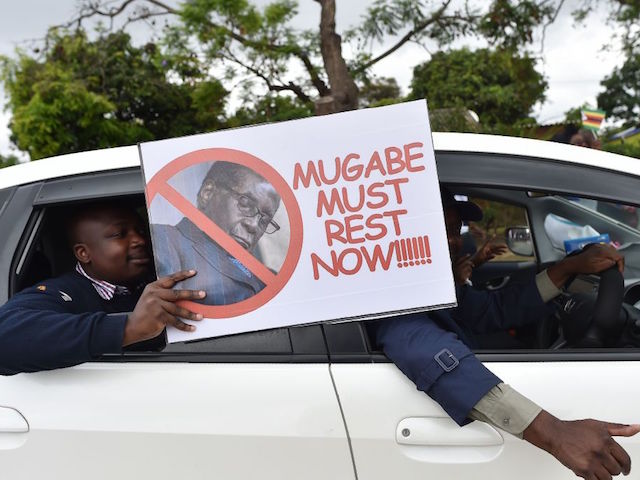
A man carries a placard as a demonstration marches towards the Zimbabwean State House while calling for the resignation of Zimbabwe’s president on November 18, 2017 in Harare. AFP/Getty Images
Mnangagwa, meanwhile, reportedly returned to Zimbabwe from exile on Thursday. Protesters held photos of the former vice president during the march. Grace Mugabe has not made any public appearances since the military takeover.

People hold a portrait of Zimbabwe former deputy president during a demonstration demanding the resignation of Zimbabwe’s president on November 18, 2017 in Harare. ZINYANGE AUNTONY/AFP/Getty Images
South African President Jacob Zuma told reporters that he expected the dispute between Mugabe and the military to be “resolved amicably” and noted that he had spoken to Mugabe while held under house arrest. South Africa took Mnangagwa when he fled Zimbabwe. South Africans also took the streets against Mugabe Saturday.
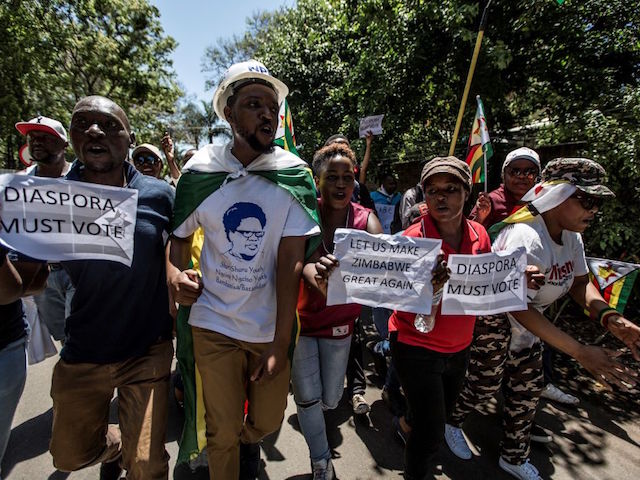
Supporters of Tajamuka Sesijikisile SA, The African Democrats Opposition Party, the Zimbabwe Communist Party, the Zimbabwe Diaspora Coalition and other groups wave Zimbabwe’s national flags and hold signs as they attend a rally at the Union Buildings in Pretoria, South Africa, to call for the resignation of Zimbabwe’s President, on November 18, 2017. GULSHAN KHAN/AFP/Getty Images
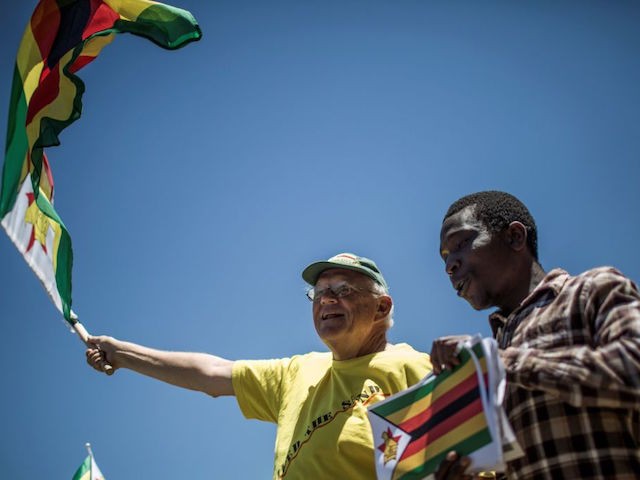
Supporters of Tajamuka Sesijikisile SA, The African Democrats Opposition Party, the Zimbabwe Communist Party, the Zimbabwe Diaspora Coalition and other groups hold Zimbabwe’s national flags as they attend a rally at the Union Buildings in Pretoria, South Africa, to call for the resignation of Zimbabwe’s President, on November 18, 2017. GULSHAN KHAN/AFP/Getty Images
In addition to South Africa, many took the streets outside the Zimbabwean embassy in London in solidarity with those protesting at home.
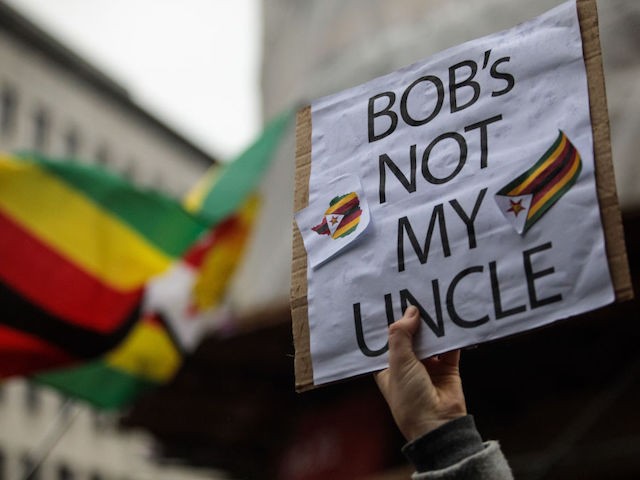
Protesters demonstrate outside the Embassy of Zimbabwe in London to call on the leader of the country Robert Mugabe to resign on November 18, 2017 in London, England. Jack Taylor/Getty Images
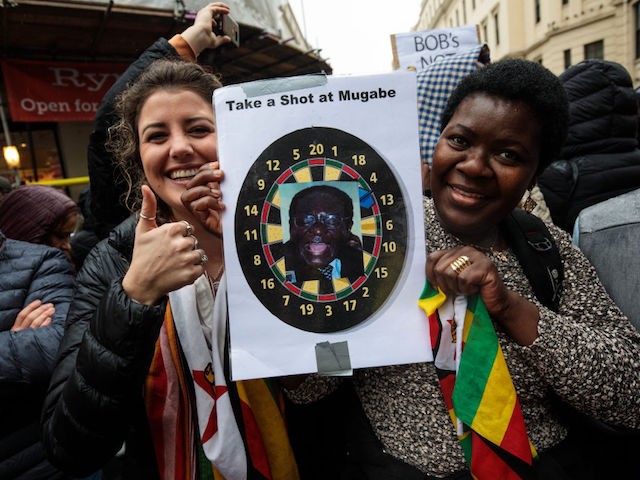
Protesters demonstrate outside the Embassy of Zimbabwe in London to call on the leader of the country Robert Mugabe to resign on November 18, 2017 in London, England. Jack Taylor/Getty Images
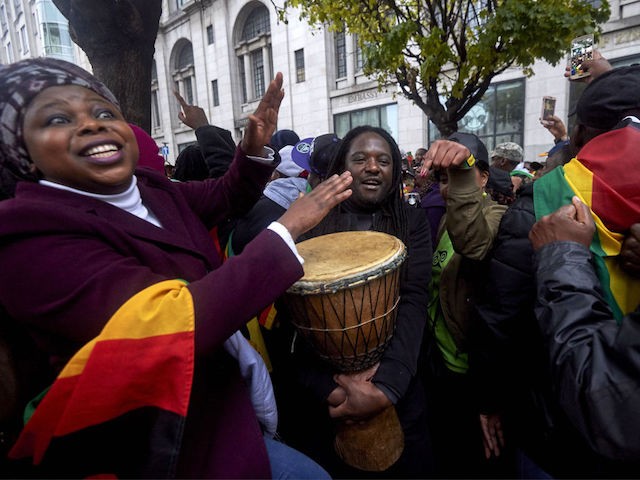
Demonstrators protest outside the Zimbabwe Embassy in London, on November 18, 2017.
NIKLAS HALLE’N/AFP/Getty Images
Mugabe made his latest public appearance on Friday and insisted he would not step down.
Protesters in Harare on Saturday expressed hope to local outlets that the Mugabe era would soon end.
“It’s a new Zimbabwe. We are expecting a lot of changes economically. We are very happy with the brave army,” a man identified as “Comrade Rambawaravira” told South Africa’s News24. “We have just come to celebrate. It’s a done deal. We have no time for Mugabe any more [sic], we came to celebrate and support our army to finish off the job and to welcome in the new Zimbabwe.”
Another protester, Tafadzwa Musarurwa, told News24 he was celebrating that “we can hope to have jobs when I finish university.” In addition to executing the genocidal “Operation Gukurahundi” campaign, which killed 20,000 people, Mugabe has presided over an economic tailspin that demanded the government issue a trillion-Zimbabwean-dollar bank note.
New Zimbabwe, a local newspaper, reported that the military not only approved of the march, but “buses and lorries provided by well-wishers were ferrying people from all over the country” to the protest.
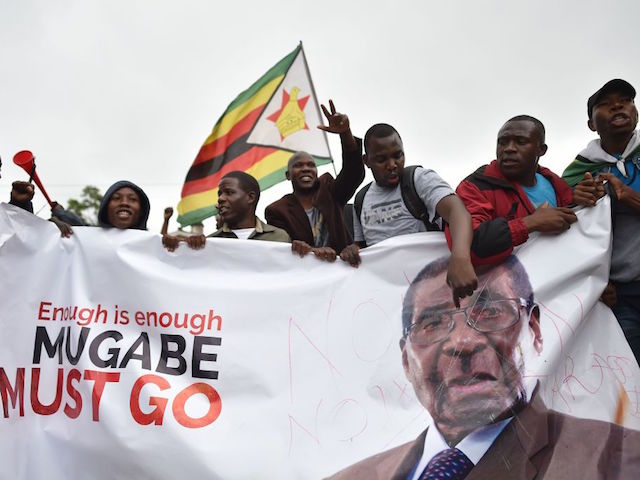
People wave a Zimbabwean national flag and carry banners during a demonstration demanding the resignation of Zimbabwe’s president on November 18, 2017 in Harare. AFP/Getty Images
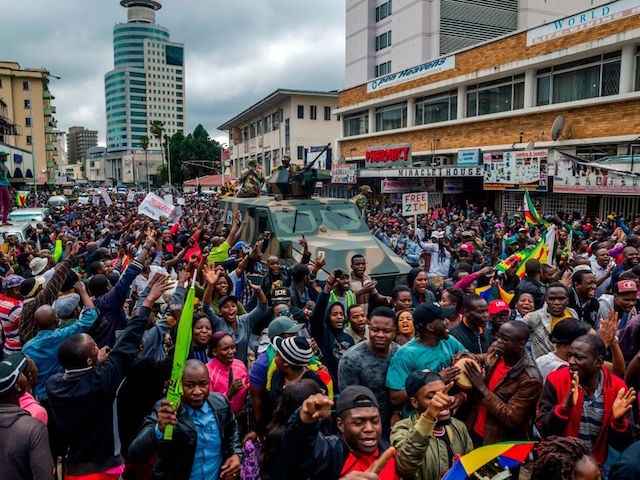
People cheer a passing Zimbabwe Defense Force military vehicle during a demonstration demanding the resignation of Zimbabwe’s president on November 18, 2017 in Harare. JEKESAI NJIKIZANA/AFP/Getty Images
Protesters, the newspaper noted, protested the anti-white Mugabe by hugging those of another race, an act “rarely seen in public.” They also made note of celebrating the military for allowing the march.
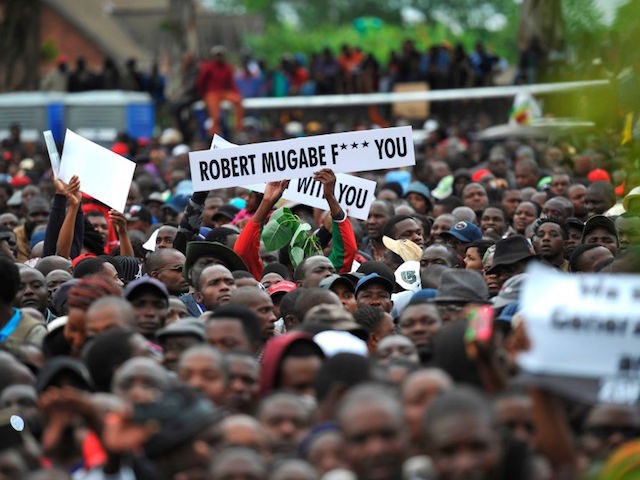
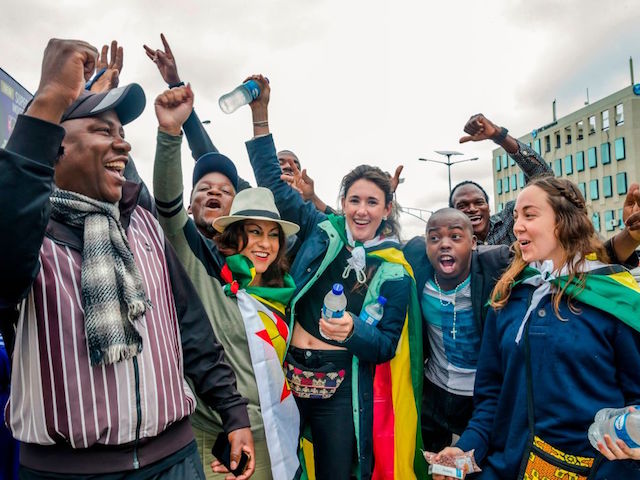
COMMENTS
Please let us know if you're having issues with commenting.